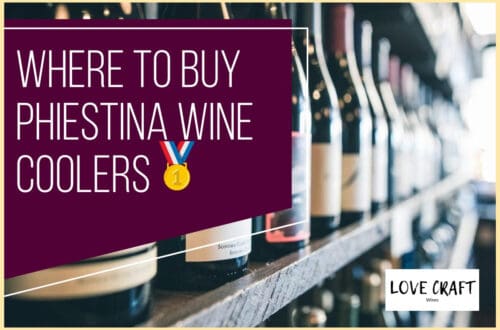Do you ever find yourself with leftover wine that you don’t want to go to waste? Maybe you’ve heard that freezing wine is a good way to preserve it, but you’re not sure if it’s safe or if it will affect the taste.
In this article, we’ll explore the pros and cons of freezing wine, how it affects the flavor and aroma, and provide tips for safely storing your wine in the freezer.
Freezing wine can be a convenient way to make sure you always have a glass on hand, but it’s important to consider the potential drawbacks. For example, freezing can cause the wine to expand and potentially break the bottle, ruining the wine. Additionally, freezing can affect the taste and aroma of the wine, which may not be desirable for some wine varieties.
So, before you go ahead and pop your wine in the freezer, let’s take a closer look at what you can expect.
Table of Contents
The Pros and Cons of Freezing Wine
Looking to chill your favorite bottle without waiting? Check out the pros and cons of putting it in the freezer!
One major advantage of freezing wine is the rapid cooling effect it has on the liquid. Within a short time, your bottle can reach the desired temperature, allowing you to enjoy your drink without delay. Additionally, freezing wine can help preserve it for longer periods of time, especially if you plan on using it for cooking or as a base for cocktails.
However, there are also some drawbacks to freezing wine. The freezing duration should be limited to 30 minutes to prevent the wine from becoming too cold and losing its flavor. It’s also important to note that not all wine types are compatible with freezing. Lighter white wines tend to freeze better than red wines, which can cause the wine to change in texture and taste.
With these pros and cons in mind, it’s important to consider the potential effects of freezing before deciding to chill your wine in the freezer.
How Freezing Affects Wine Flavor and Aroma
You might be surprised to find out that freezing can actually alter the taste and smell of your favorite bottle. When wine is frozen, the water in it forms ice crystals that can damage the delicate structure of the wine. This can lead to changes in the aroma and flavor of the wine, making it taste flat or even unpleasant.
Additionally, temperature fluctuations that can occur during the freezing process can also have a negative impact on the wine. The impact of freezing on wine flavor and aroma will depend on several factors, including the type of wine, its age, and the temperature and duration of the freeze.
Generally, younger wines with less complex flavors and aromas are more likely to survive freezing intact. However, if you want to ensure that your wine retains its original taste and smell, it’s best to avoid freezing it altogether. Instead, consider other methods of storing wine that are better suited to preserving its quality.
Tips for Safely Storing Wine in the Freezer
If you’re thinking of storing your favorite bottle in the freezer, here are some tips to ensure that your next sip is just as delicious as the first.
First and foremost, make sure that the wine bottle is corked tightly to prevent any air from entering the bottle. The wine freezing process can cause the liquid to expand, which can potentially push the cork out and ruin the wine.
Next, be mindful of the freezing temperature. The ideal temperature for freezing wine is -18°C or 0°F. Any colder than that, and the wine may freeze too quickly, causing the bottle to shatter.
It’s also important to note that freezing wine can alter the taste and aroma, so it’s not recommended for high-quality wines that are meant to be savored. Instead, consider using the freezer as a last resort for inexpensive or leftover wine.
In conclusion, while freezing wine can be a convenient option for some, it’s important to follow these tips to ensure that your wine is safely stored and doesn’t lose its flavor. However, if you’re looking for alternative preservation methods for wine, there are other options to consider such as using a wine fridge, vacuum sealers, or even transferring the wine to a smaller bottle to reduce air exposure.
Alternative Preservation Methods for Wine
There are other options for keeping your favorite bottle fresh and flavorful longer, and they don’t involve the freezer. Wine preservation is a common concern, especially if you don’t plan on finishing a bottle in one sitting.
Decanting is a popular preservation method that involves transferring the wine from its original bottle to a decanter. The process allows the wine to aerate, which enhances the flavors and aromas while removing any sediment that may have formed. Once decanted, the wine can be stored in a cool, dry place for up to three days.
Another preservation method is vacuum sealing. With a vacuum pump, you can remove the air from an opened bottle, slowing down the oxidation process that can turn wine stale. This method can keep wine fresh for up to a week, but it’s essential to store the bottle upright to prevent leakage.
When it comes to storage, the fridge is a popular choice, but it’s not always the best option. A cold environment can diminish the wine’s flavors and aromas, so it’s best to store white wine in the fridge and red wine in a pantry or cool, dark closet.
Understanding the Science Behind Wine Preservation
By understanding the science behind how oxygen affects the quality of your favorite bottle, you’ll be able to choose the best preservation method to maintain the rich flavors and aromas of your wine.
Chemical reactions between oxygen and the wine can lead to oxidation, which causes a loss of flavor and aroma. When wine is exposed to oxygen, the ethanol in the wine reacts with the oxygen to form acetaldehyde, which gives the wine a stale taste and aroma.
Temperature gradients also play a significant role in wine preservation. Higher temperatures can increase the rate of chemical reactions, which can lead to faster oxidation. It’s essential to store wine at a stable temperature to ensure the preservation of the wine’s quality.
Wine is best preserved at a temperature between 45-65 degrees Fahrenheit, with a relative humidity of around 70%. By understanding the science behind wine preservation, you can choose the best preservation method to ensure the longevity of your wine’s quality.
Frequently Asked Questions
What is the ideal temperature for storing wine in a freezer?
You’ve got the perfect bottle of wine and you’re looking to store it in the freezer for a later occasion.
But what temperature should you set it at? Freezer maintenance is crucial for ensuring that your wine stays at the ideal temperature for preservation.
A temperature of 15-18°F (-9°C) is recommended for storing wine in the freezer. However, it’s important to note that wine can freeze and expand in the freezer, potentially damaging the bottle and the wine itself.
To prevent this, make sure to keep the wine in the freezer for no longer than a few hours before transferring it back to a regular temperature. Additionally, follow these wine preservation tips: keep the bottle in a dark, cool place away from light and heat, store it on its side to keep the cork moist, and avoid storing it near strong odors.
With proper freezer maintenance and wine preservation techniques, your bottle of wine will be ready to enjoy whenever the occasion calls for it.
Can all types of wine be safely stored in a freezer?
When it comes to wine storage, temperature considerations are crucial. While a freezer may seem like a convenient option for keeping your wine cool, not all types of wine can be safely stored in one.
Red wines, for example, have a lower freezing point than white wines, which means they can tolerate colder temperatures. However, even red wines should not be stored in a freezer for extended periods as the extreme cold can cause the wine to expand and potentially break the bottle.
In general, it’s best to stick to a wine fridge or a cool, dark place for storing your wine to ensure it stays in optimal condition.
How long can wine be stored in a freezer without losing its quality?
To preserve the quality of wine, it’s important to understand how long it can be stored in a freezer. Proper freezer maintenance is essential to ensure that the wine remains at a consistent temperature, ideally between -5°C and -15°C.
Wine preservation techniques such as vacuum sealing or using airtight bottles can also help to maintain the quality of the wine. Generally, white wines can be stored in a freezer for up to 3 months, while red wines can last for up to 6 months.
It’s important to note that freezing wine can alter its taste, so it’s best to only freeze wine that is intended for cooking or as a base for cocktails.
Will freezing wine affect its alcohol content?
Oh, you thought freezing wine wouldn’t affect its alcohol content? That’s cute.
The freezing process actually concentrates the alcohol in the wine, as water freezes before alcohol does. So while your wine might still taste okay after being stored in the freezer, it’s going to pack a bigger punch than before.
However, keep in mind that while the alcohol content may increase, the wine flavor may suffer. The freezing process can damage the delicate flavors and aromas in the wine, leaving you with a less enjoyable drinking experience.
So, while it’s technically safe to store wine in the freezer, it’s not necessarily the best idea for preserving the quality of the wine.
Can frozen wine be thawed and consumed at a later time?
When it comes to thawing frozen wine, there are a few techniques you can use to ensure that the wine is still enjoyable once it has been defrosted.
One method is to place the frozen bottle in the refrigerator for several hours or overnight, allowing it to thaw slowly.
Alternatively, you can place the bottle in a bowl of cool water to speed up the thawing process.
Once the wine has thawed, it can be consumed just like any other wine.
While freezing wine is not recommended for long-term storage, it can be a useful culinary tool for making wine slushies, adding to sangria, or even using as a cooking ingredient.
Just be sure to use thawed wine within a few days for optimal taste.
Conclusion
So, can you safely store wine in the freezer? The answer is yes, but with some caveats.
Freezing wine can be a convenient way to preserve an open bottle, but it can also alter the taste and aroma of the wine. If you do decide to freeze wine, it’s important to take some precautions to ensure that it stays safe to consume.
One interesting statistic to consider is that freezing wine can actually increase its alcohol content. This occurs because water freezes at a higher temperature than alcohol, so when you freeze wine, the water content separates from the alcohol, leaving a more concentrated solution of alcohol behind.
This means that your frozen wine will likely have a higher alcohol content than it did before it was frozen. However, it’s important to note that the increase in alcohol content is typically only a few percentage points, so it’s not a significant enough change to drastically alter the wine’s taste or effect.
In conclusion, freezing wine can be a viable option for preserving an open bottle, but it’s important to be aware of the potential changes to the wine’s taste and aroma. By following some basic tips for safe storage, such as using a freezer-safe container and allowing the wine to thaw slowly, you can help ensure that your frozen wine remains safe to consume.
Ultimately, whether or not to freeze wine comes down to personal preference and individual circumstances, so it’s up to you to decide if it’s the right choice for your needs.





